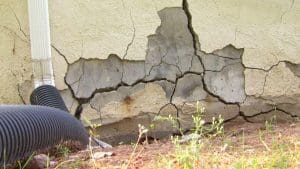Se vere weather conditions can affect your home’s foundation and cause damage. From the harsh sun, heat, and drought conditions common across most of Texas many months out of every year, to the cold of freezing rain, snow, and ice, the clay soil of the Lone Star State is known for the way it expands and contracts. This movement can create an uneven surface underneath your home, which can lead to foundation damage that can be expensive and complicated to repair. The soil surrounding your home’s foundation can begin to shift as it dries out and shrinks, causing settling. If the soil underneath the middle of your home’s foundation remains moist while the soil around the edges contracts and shrinks, the result can be an uneven surface, raised in the center and lower along the outside edges. This domed or mounded soil puts pressure on the bottom of your home and can cause your foundation to crack and shift due to uneven weight disbursement.
vere weather conditions can affect your home’s foundation and cause damage. From the harsh sun, heat, and drought conditions common across most of Texas many months out of every year, to the cold of freezing rain, snow, and ice, the clay soil of the Lone Star State is known for the way it expands and contracts. This movement can create an uneven surface underneath your home, which can lead to foundation damage that can be expensive and complicated to repair. The soil surrounding your home’s foundation can begin to shift as it dries out and shrinks, causing settling. If the soil underneath the middle of your home’s foundation remains moist while the soil around the edges contracts and shrinks, the result can be an uneven surface, raised in the center and lower along the outside edges. This domed or mounded soil puts pressure on the bottom of your home and can cause your foundation to crack and shift due to uneven weight disbursement.
During rainy season, clay soil can expand significantly as it absorbs the moisture from the rain. Swelling soil can cause increased pressure on your home’s foundation, causing cracks to form in the walls. This can cause damage to the under slab plumbing system, which can result in water leaks, adding even more moisture to the already soaked soil. If a leak forms and remains undetected for a long period of time, repairs can be complicated and costly. If you notice a sudden drop in water pressure or an increase in your water bill, you could be looking at a water leak.
If you become aware of the presence of any of these symptoms, your foundation may have become damaged:
- Visible cracks in your foundation
- Cracks in the mortar of any brickwork
- Bowed (curved) foundation walls
- Cracked sheet rock and/ or plaster
- Uneven floors (tilted or sloping)
- Separation between foundation and wall(s)
- Chimney separation from the side of the house
- Windows that won’t open or close properly
- Cracks in garage floor and/ or other concrete floors in the home
- Gaps where two external walls are supposed to meet
While it’s true that you can’t control the Texas weather, there are a few things you can do to help protect your home’s foundation from becoming damaged by extreme weather conditions. Keep the soil around the foundation moist by watering it during the dry season to prevent it from becoming too dried out. To avoid overwatering, use a soaker hose with an attached timer, or install an underground drip irrigation system. Check that the area around the house is sloped away from the foundation at a gradient of one inch per foot so any excess water flows away from the house. Install extensions on your downspouts to direct water flow away from the foundation. If you have trees growing near the house, have a professional check for any root infiltration. Tree roots can cause damage by drawing too much moisture from the soil and can also damage any plumbing they come in contact with.
Why Us?
If hot or cold weather conditions have caused damage to your foundation, you will need an experienced professional to correct the problem. At Advanced Foundation Repair, we understand the damage Texas weather conditions can do to foundations. We provide precise inspections to pinpoint foundation issues before they become major problems, and our Advanced Pro-Lift Technology will professionally eliminate any issues and give you the peace of mind you deserve. With easy payment and financing options and transferable lifetime warranties, we offer an affordable way to fix your foundation problems for life. For quality foundation repair and excellent customer service, call Advanced Foundation Repair in Dallas when extreme hot or cold weather conditions cause foundation problems.
